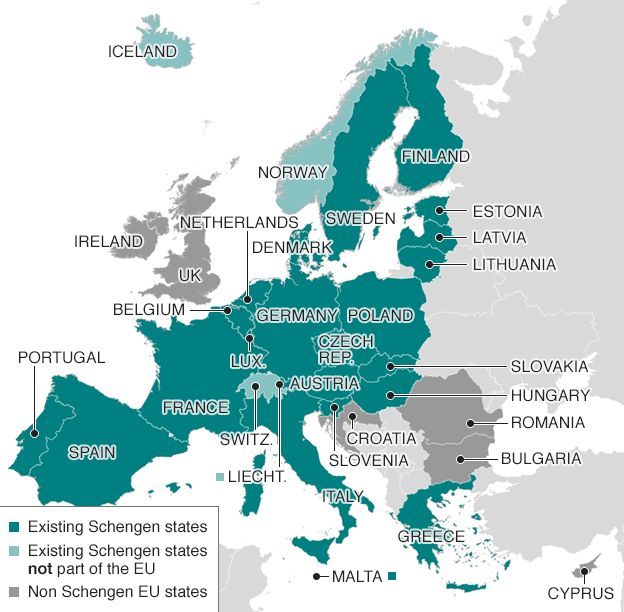EU Court rules no jail for illegal migrants
- 6 hours ago
- Europe
 GETTY IMAGES
GETTY IMAGES
Non-EU migrants illegally entering an EU state in the Schengen zone should not face detention on those grounds, says the European Court of Justice.
Migrants staying illegally should instead be returned to the country from which they came under the so-called Return Directive, it said.
The ruling applies to migrants crossing borders within the passport-free area and on leaving the zone.
It will infuriate critics of EU policy, but contains several important caveats.
The ruling was triggered by the case of a Ghanaian migrant who was found to be using false Belgian travel documents by French police at the entrance to the Channel Tunnel.
Selina Affum was placed in police custody on grounds of illegal entry into French territory but argued that this was unlawful, in light of the EU's Return Directive.
Under the directive, an illegal migrant told to leave has up to 30 days to go voluntarily. After that, removal should not involve excessive force or place the person's life in danger.
The French court of cassation referred Ms Affum's case to the European Court of Justice, the EU's highest court.
"The Return Directive prevents a national of a non-EU country who has not yet been subject to the return procedure being imprisoned solely because he or she has entered the territory of a Member State illegally across an internal border of the Schengen area," the Luxembourg-based court ruled.
This was also the case when the migrant "is intercepted when leaving the Schengen area".

The ruling does not apply to the UK or Ireland, which are not within the Schengen zone. It also does not apply to Denmark, which although a member of the Schengen zone holds an opt out from European Union justice policies.
The ruling also contains some important conditions.
It says migrants may be detained - for up to 18 months - if there is "a risk of the removal being compromised", which may be interpreted to mean that they are a flight risk.
Detention is also permitted if a person is subject to a deportation order and has refused to go, or if they have already been deported, and have attempted to re-enter the country illegally, in breach of an entry ban.
The Source:http://www.bbc.com/news/world-europe-36469014
Comment:
Schengen: What is it and why is it important for Canada
The Schengen Zone agreement allows the citizens of 26 European Union counties to move, work and live freely in each other counties. Britain, Ireland, Switzerland are not in the Zone but have reciprocal agreements with most Schengen counties allowing freedom of movement and work.
Despite the furor over refugees and the probability that Britain will feel obliged to leave the EU, the core principles of the Schengen Zone, and its reciprocal agreements, will survive.
Why should Canada care?
First, Canada should consider itself lucky to get whatever workers and immigrants it can get from Europe. After all, why would any materialistically driven Italian, Portuguese etc bother with Canada when incomes, heath benefits and social services in other Schengen jurisdictions are superior to those of Canada.
Second, with the ratification of Canada Europe Trade Agreement (CETA) , Canada will commit itself to labour mobility standards, including visa matters. You can bet the farm that Europe will start demanding Schengen Zone standards with Canada.
Third, Canada will have to decide whether we are joining Europe in reducing human movement barriers or whether we are already buying into Trumpian nonsense as we regress into a phony visa war against the global Klingon conspiracy. Canada’s Electronic Authorization Visas are an unfortunate regressive gesture by a government incapable of mounting a true perimeter defense with ships, airplanes and internal enforcement. The visas don’t make us safer. They make us feel safer.
Fourth, Canada will have to stop pretending that it can have the benefits of free trade in goods and services while running a labyrinth on human movement. Canadians expect to jump on an airplane and travel to Europe for a visit or for business. But we expect the Europeans to go through a series of hoops. Do we expect that this arrogance can continue?
Fifth, Canada will have to stop pretending that it is capable of dealing productively and positively with global human movement. If we can’t deal with Europeans or even with our own internal inter provincial restrictions, then we are doomed to stumble along having others whittle away at our sovereignty and wealth.
- I have no doubt that senior policy thinkers in Ottawa are considering all of the above
- I have no doubt that senior policy implementers will screw it all up
Richard Boraks, May 13 2016
No comments:
Post a Comment